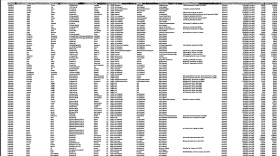One of the more closely-watched Senate contests of 2016 won’t be bound by a so-called people’s pledge after all.
Sen. Kelly Ayotte, the Republican incumbent, and Democratic Gov. Maggie Hassan have failed to reach an agreement to limit the influence of outside political groups in the race.
The pledge was first proposed by Ayotte on Thursday. It called for both campaigns to “work together” to discourage third-party spending on radio, television and digital advertising. In a letter to Ayotte on Friday morning, Hassan raised the stakes by proposing the two campaigns also agree to spend no more than $15 million each.
Ayotte refused, and in a statement said the governor’s counterproposal was her attempt to “kill” the pledge without outright rejecting it. “This move is politician speak for ‘I do not want to sign the People’s Pledge,’” Ayotte said.
Three outside groups have already dropped $2.6 million on the Ayotte-Hassan contest, including almost $1.9 million in TV and digital ads that would be off-limits under the pledge.
Last summer, before Hassan officially entered the race, the Senate Majority PAC funded $600,000 in TV ads attacking Ayotte. But most of the ad spending - more than $1.3 million – benefits the incumbent, which Hassan’s campaign manager, Marc Goldberg, was quick to criticize.
“[While] Senator Ayotte feigns interest in reining in outside spending, her dark money allies announced tens of thousands of dollars in additional spending on her behalf,” he said in a statement.
So-called dark money is spending by groups that don't disclose their donors. It's been growing in recent elections, and dark-money groups like Americans for Prosperity are expected to play a role in this year's Senate elections.
This is the second time in as many elections that a pledge has failed in a New Hampshire Senate race.
Sen. Jeanne Shaheen called for one in her 2014 re-election campaign against former Massachusetts Sen. Scott Brown. Brown rejected the idea, and outside groups – including several that are already invested in Hassan-Ayotte – went on to spend close to $30 million. Add in the $25.6 million spent by the two campaigns, and it was the most expensive election in New Hampshire history.
Pledges can effectively eliminate millions of dollars’ worth of television advertising, much of it negative.
When Brown and Elizabeth Warren agreed to a pledge in Massachusetts in 2012, outside spending accounted for just over $8 million in the race or about 9 percent of the total spent. By comparison, a heavily contested Senate race in Virginia that year attracted more than $52 million, or 62 percent of the total, from independent groups.
Pledges typically don’t prohibit outside spending on voter contact. That was the case in the Brown-Warren race. As the graph below shows, independent groups funded direct mail and other get-out-the-vote activities late in the campaign.
The Hassan-Ayotte race is expected to be consequential. Roll Call predicts it will be one of about a dozen contests that could determine which party controls the Senate in the next Congress.
Both candidates make compelling arguments in favor of limiting the influence of outside spending. But it’s also true that campaign-finance reform is more popular with voters this year than ever.
Democrat Bernie Sanders, who won this week’s New Hampshire primary by more than 20 points, has made overhauling federal campaign-finance rules a major plank in his presidential platform. Many Granite State voters who helped billionaire businessman Donald Trump win the Republican primary by 17 points said they liked the fact that he didn’t need wealthy donors.
And since last summer, numerous polls have found that Americans from both parties are angry about the role of money in politics. A recent survey by the Pew Research Center found that 76 percent say money has greater influence on politics than ever before.







